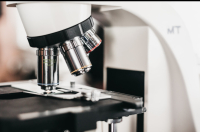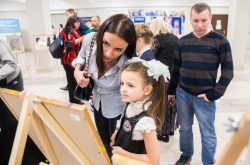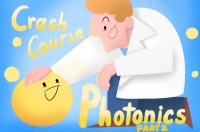The equipment system includes the scanning probe microscope NanoTutor, a device for producing nanoprobes, a digital optical microscope, samples, and a virtual simulator. To learn how microscopes work, or get the information about their functions and opportunities they offer children can use a special application. The system interacts with young researchers using 3D animation — the characters of famous Russian cartoon Kikoriki explain the complex principles of probe and optical microscopy.
As of now, teachers of physics and chemistry already take part in training courses organized by the Faculty of Advanced Training of Teachers in cooperation with the Department of Nanophotonics and Metamaterials. The teachers study the basics of scanning probe microscopy and nanoprobe production, as well as learn how to work with the application and organize research activities for senior school students.
At the "nanoclasses," children use special books that give detailed information on stages of research projects. Children can also participate in lectures on nanotechnologies at ITMO University. Recently, its lecturers met with young researchers at the Baltic Science and Engineering Competition. Specialists of NT-SPB in collaboration with the School League Rosnano develop tasks for the competition and lectures on nanotechnologies. NT-SPB and ITMO plan to organize an engineering project contest for high school students of St. Petersburg.

Alexander Golubok, Ivan Mukhin and Mikhail Mukhin
"We use a probe microscope to show children something new in such fields as physics, IT and engineering. Using the microscope they will be able to look at atoms and other microscopic elements and surfaces that cannot be seen using a typical optical microscope," said Alexander Golubok, professor of the Department of Nanophotonics and Metamaterials.
During the classes, children will study how a butterfly wing looks like, learn how the lotus effect works, and analyze different materials. The teachers will involve them into individual and team research projects and teach how to present the results of these studies.
"The children use real research equipment that meets all international requirements. This will make them interested in science and discoveries. We would be happy to invite them to start their research careers at our university," said Mikhail Mukhin, head of the Nanocenter of ITMO’s Metamaterials Lab.

Photo credit: dezinfo.net
All the equipment was developed by ITMO’s researchers and specialists of NT-SPB. They have received several patents for the devices. The system is used not only by school students, but also by Bachelor’s, Master’s and PhD students of the university. The equipment has also been installed in two Italian universities in Rome and Padua.
The developers of the NanoTutor will present the project in Sirius [an educational center for gifted children in Sochi -Ed.] and at the All-Russia Engineering Olympiad by the National Technology Initiative. The researchers plan to organize new projects for promoting interaction between universities and high schools.




